Finding Your Perfect Writing Home: A Guide to Blogging Sites
Choosing the right blogging site is crucial for success. This guide presents eight top blogging sites for writers in 2025, helping you find the perfect platform to share your work. Whether you're a small business owner, digital marketing professional, or independent writer, this list simplifies finding a platform that meets your needs. We'll cover the pros and cons of BlogMaker, WordPress.com, Medium, Ghost, Substack, Blogger, Wix, and Squarespace, so you can overcome the challenge of selecting the right blogging site for writers and start publishing.
1. BlogMaker
BlogMaker positions itself as a premium, no-code blogging platform designed for effortless content creation and publication. It caters to a diverse audience, including small business owners, digital marketers, independent bloggers, freelancers, and essentially anyone looking to establish a professional online presence without the technical complexities usually associated with setting up and maintaining a blog. BlogMaker promises to handle the heavy lifting, from hosting and security to design and analytics, allowing writers to focus solely on crafting compelling content. This makes it an attractive option for those prioritizing ease of use and a streamlined workflow.
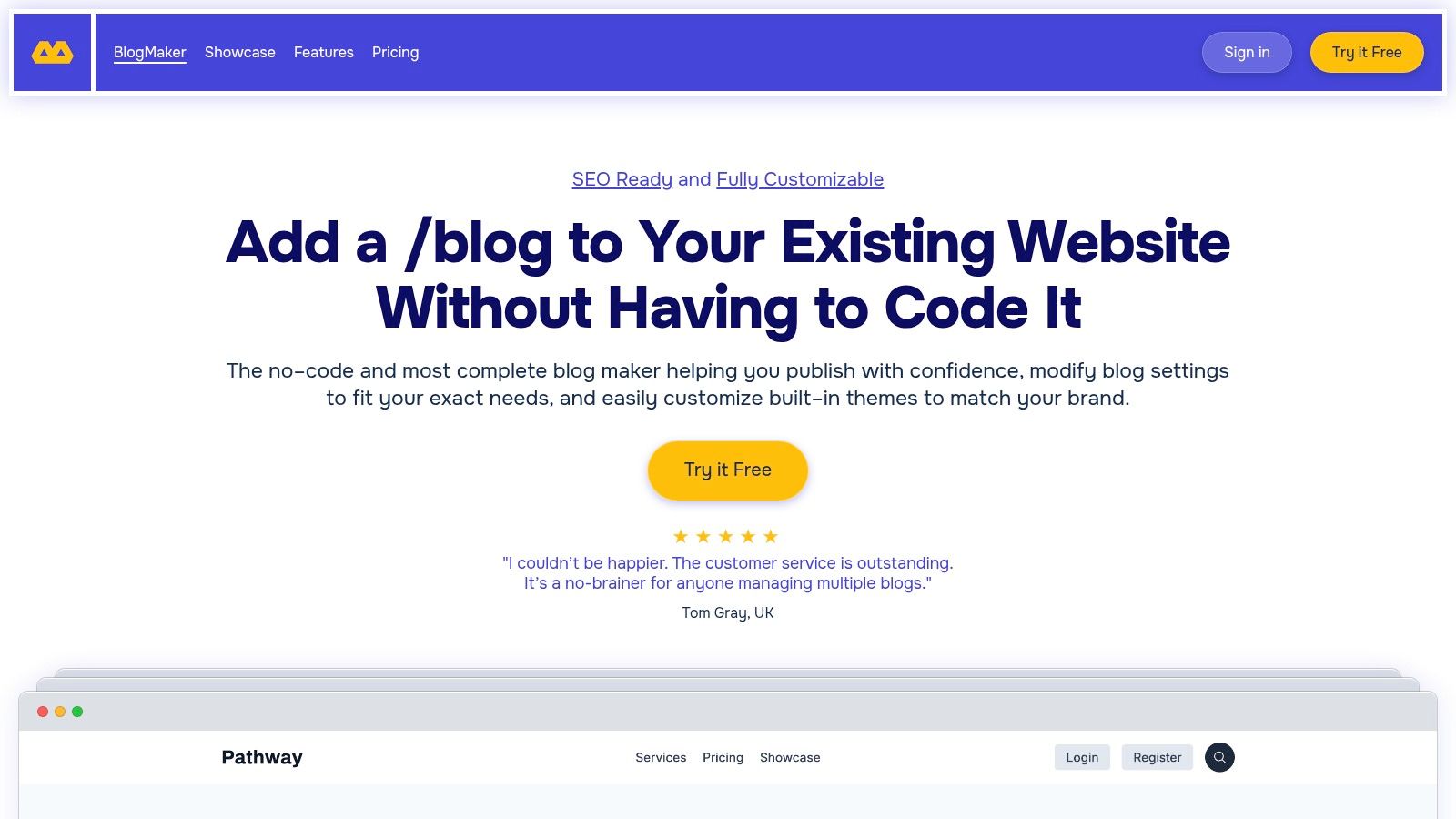
One of BlogMaker's key selling points is its all-inclusive approach. The platform offers a comprehensive suite of features designed to simplify the blogging process. Unlike traditional blogging platforms that require separate hosting, security certificates (SSL), content delivery networks (CDN), and often numerous plugins, BlogMaker bundles all these essentials into a single package. This not only simplifies setup and management but also ensures predictable budgeting with flat yearly pricing. While specific pricing details aren't readily available on the website and may require direct inquiry, this bundled approach can potentially save users significant time and money in the long run, eliminating the need to juggle multiple subscriptions and services.
For writers concerned about SEO, BlogMaker offers a unique advantage. The platform runs your blog on a subdirectory (e.g., yourwebsite.com/blog) of your existing website. This is a significant departure from subdomain setups (e.g., blog.yourwebsite.com) often used by other platforms and offers powerful SEO benefits. By keeping your blog content within your main domain, you consolidate all traffic and SEO value, boosting your primary website's authority in the eyes of search engines. This can lead to improved search rankings and increased organic visibility for your entire online presence.
BlogMaker emphasizes user-friendliness with its intuitive dashboard. Writers can create and preview content in real-time, giving them a clear picture of how their posts will appear to readers. The platform offers advanced publishing controls, allowing for scheduled posts and other essential content management features. Furthermore, a built-in, privacy-first analytics suite provides valuable insights into visitor behavior and content performance without requiring integration with complex third-party tools. This streamlined approach to analytics allows writers to easily track key metrics and refine their content strategy based on data-driven insights.
The platform also shines in terms of design and customization. BlogMaker's proprietary DesignStudio empowers users to fully customize their blog's appearance, including fonts, colors, and layouts, without any coding knowledge. This level of control ensures brand consistency and allows writers to create a visually appealing blog that aligns perfectly with their overall brand identity. While the platform may not offer the extensive third-party plugin ecosystem found in platforms like WordPress, the built-in customization options provide a robust and user-friendly alternative for those prioritizing ease of use over maximum flexibility.
Another noteworthy feature is the integrated newsletter functionality. BlogMaker allows writers to seamlessly disseminate their blog posts via custom domains and embedded signup forms, making it easy to grow and engage their audience. This built-in email marketing capability eliminates the need for separate newsletter services, further streamlining the content creation and distribution process.
For writers looking for a hassle-free blogging experience, BlogMaker's quick setup and dedicated 24/7 customer support are significant advantages. The platform requires no server management or plugin upkeep, allowing writers to focus on content creation rather than technical maintenance. The readily available customer support ensures that any issues are addressed promptly, providing peace of mind and a smooth user experience. Finally, BlogMaker's commitment to sustainability, powered entirely by green energy, resonates with environmentally conscious users.
In conclusion, BlogMaker stands out as a strong contender for writers seeking a premium, all-in-one blogging solution. Its focus on ease of use, SEO optimization, and integrated features makes it an attractive alternative to more complex platforms. While the lack of readily available pricing information might be a minor drawback, the potential benefits in terms of streamlined workflow, cost predictability, and dedicated support could make BlogMaker a worthwhile investment for writers of all levels. You can explore BlogMaker and its features further by visiting their website: https://blogmaker.app
2. WordPress.com
WordPress.com is a prominent name in the blogging sphere, and for good reason. It offers a hosted version of the renowned WordPress software, providing writers with a robust yet accessible platform to share their thoughts and build an online presence. Whether you're a seasoned blogger or just starting, WordPress.com offers a blend of features and flexibility that makes it a compelling choice among blogging sites for writers. It's particularly attractive for those who seek a balance between ease of use and powerful functionality without the technical headaches of self-hosting.
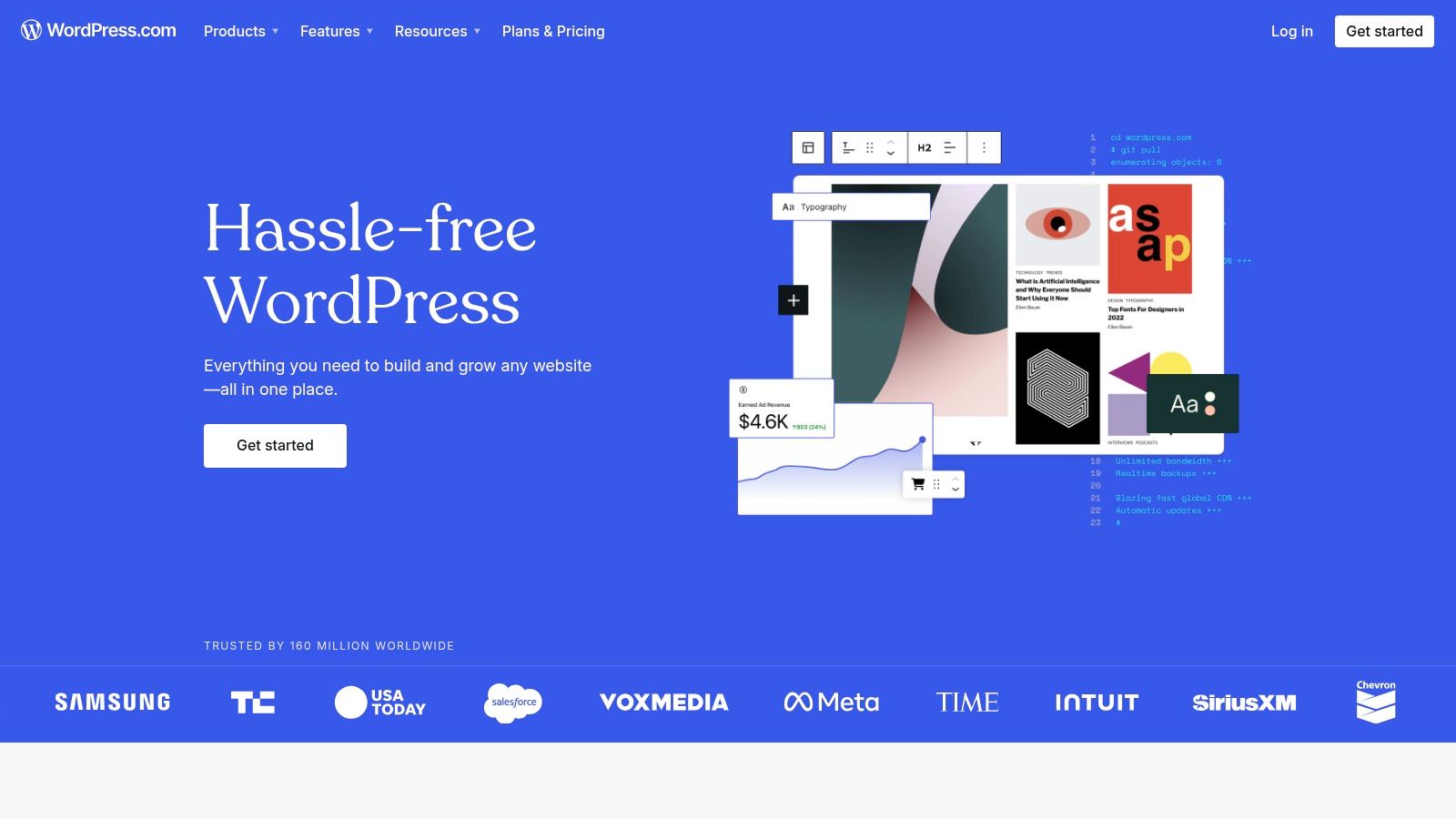
One of the key advantages of WordPress.com is its ease of setup. You can create an account and have a basic blog running in minutes. This streamlined process eliminates the need for technical expertise in web hosting, domain management, and software installation. The platform handles all the technical backend, allowing you to focus solely on creating compelling content. This makes it a great option for non-technical entrepreneurs and writers who prefer a hands-off approach to website management.
For those seeking a more customized experience, WordPress.com offers a vast library of themes and templates. These pre-designed layouts provide a starting point for your blog's design, allowing you to choose a style that reflects your brand or personal aesthetic. Many themes are free, while premium themes offer more advanced customization options and design features. This extensive selection allows you to easily craft a professional-looking blog without needing coding skills. Further customization is possible via the "Customizer," which allows you to tweak various aspects of your theme in real-time.
WordPress.com’s built-in SEO tools are another significant advantage, especially for bloggers looking to expand their reach. These tools help optimize your content for search engines, making it easier for readers to find your blog organically. Features such as automatic XML sitemap generation, customizable permalinks, and integration with Google Analytics provide valuable insights into your blog’s performance and help you refine your content strategy for maximum visibility. Learn more about WordPress.com to understand how to maximize your blog traffic using such tools.
Social media integration is seamless on WordPress.com, making it easy to share your content across multiple platforms and engage with your audience. The platform offers built-in sharing buttons and allows you to connect your blog to various social media accounts. This integrated approach simplifies content promotion and helps build a strong online community around your blog.
While WordPress.com is incredibly user-friendly, the sheer number of features can feel overwhelming for complete beginners. Navigating the various settings, customizing themes, and understanding the different plan options might require a learning curve. Fortunately, extensive documentation and a large online community provide ample support for users at all levels.
Pricing on WordPress.com ranges from a free plan to various paid plans offering additional features and storage. The free plan is a great starting point for new bloggers, but it comes with limitations such as limited customization options and displayed ads. Premium plans unlock features such as custom domain names, advanced design customization, monetization options, and removal of ads. Choosing the right plan depends on your individual needs and budget.
Compared to self-hosted WordPress.org, WordPress.com offers less flexibility in terms of plugin installation and code customization. While the free plan restricts plugin access entirely, some paid plans offer access to a limited selection. This might be a drawback for bloggers who require highly specialized plugins for specific functionalities. However, the integrated Jetpack plugin suite provides many commonly needed features, such as enhanced security, performance optimization, and design tools.
For writers looking for blogging sites that combine ease of use with powerful features, WordPress.com is a strong contender. Its intuitive interface, extensive theme library, built-in SEO tools, and social media integration make it a great option for both beginners and experienced bloggers. While limitations on the free plan and the potential learning curve might be considerations, the platform’s overall accessibility, extensive support network, and scalability make it a worthy choice for writers aiming to establish a robust online presence.
3. Medium
Medium is a popular choice among writers seeking blogging sites due to its focus on content quality and reader engagement. It's a social publishing platform designed specifically for storytelling and reaching a built-in audience. This makes it particularly attractive to writers who prioritize crafting compelling narratives and connecting with a wider readership without the technical hurdles of managing a standalone blog. Medium's clean, distraction-free interface allows writers to focus on what they do best: writing. Its sophisticated algorithm helps surface quality content to interested readers, increasing the chances of organic discovery and widening your potential audience. This makes it one of the best blogging sites for writers looking for a hassle-free platform.

For small business owners, digital marketing professionals, and non-technical entrepreneurs, Medium offers a simple yet powerful way to publish thought leadership articles, industry insights, and company updates without investing in a separate website or blog. Independent bloggers and writers benefit from the platform's existing audience and organic reach, allowing them to build a following and establish their voice. Web agencies and freelancers can leverage Medium to showcase their expertise and attract potential clients by publishing case studies, tutorials, and articles relevant to their services. This inherent searchability further solidifies its position amongst the top blogging sites for writers seeking online visibility.
Medium offers a range of features designed to enhance the writing and publishing experience. Its minimalist writing interface eliminates distractions, allowing writers to focus on their craft. The built-in audience and content discovery system helps connect writers with readers interested in their topics. Medium's social features, like claps, comments, and follows, foster a sense of community and encourage reader interaction. The Publication system enables collaborative writing and allows writers to contribute to established publications within their niche. Additionally, the Medium Partner Program provides opportunities for monetization, allowing writers to earn money based on reader engagement.
One of the key advantages of Medium is its ease of use. There are no technical setup or maintenance requirements, making it accessible even to those with limited technical skills. The platform handles all the technical aspects, allowing writers to focus solely on creating content. This streamlined approach differentiates it from other blogging sites for writers who may feel intimidated by the technical complexities of running a website. The strong community of engaged readers and writers on Medium fosters a supportive environment for sharing and discovering new content. The potential to earn money through the Partner Program provides an added incentive for consistent content creation.
However, Medium also has its limitations. Customization and branding options are limited, which can be a drawback for businesses wanting to maintain a strong brand identity. Writers don't have full ownership of their content platform, meaning they're subject to Medium's terms of service and algorithm changes. These algorithm changes can impact content visibility and reach, potentially affecting audience growth. While the Partner Program offers monetization opportunities, the earnings potential is often limited compared to owned platforms. For instance, driving traffic back to your own website from Medium can be challenging, potentially hindering lead generation efforts. Thinking about SEO? Learn more about Medium and other platforms to improve your strategy.
Medium's pricing structure consists of a free membership and a premium membership option ($5/month or $50/year). The free membership allows unlimited reading and publishing, while the premium membership offers additional features like offline reading and an expanded selection of publications. Technically, all you need is a computer or mobile device with internet access to start publishing on Medium.
In comparison to other blogging sites for writers, such as WordPress.com or Blogger, Medium offers a more streamlined and user-friendly experience. While WordPress.com and Blogger offer greater control over customization and monetization, they also require more technical setup and maintenance. Medium strikes a balance between ease of use and functionality, making it an attractive option for writers who prioritize simplicity and reach.
4. Ghost
For writers seeking a platform prioritizing speed, clean design, and built-in monetization options, Ghost stands out as a powerful contender among blogging sites. Designed specifically for professional writers, journalists, and content creators, Ghost offers a modern, open-source publishing platform that emphasizes simplicity and performance. Unlike more general-purpose platforms, Ghost caters to those who are serious about their writing and building a loyal audience. It achieves this through features explicitly geared towards content creation, distribution, and reader engagement. Whether you're a seasoned blogger or just starting out and want to learn more about content creation for beginners — Learn more about Ghost — Ghost provides the tools to cultivate a thriving online presence.
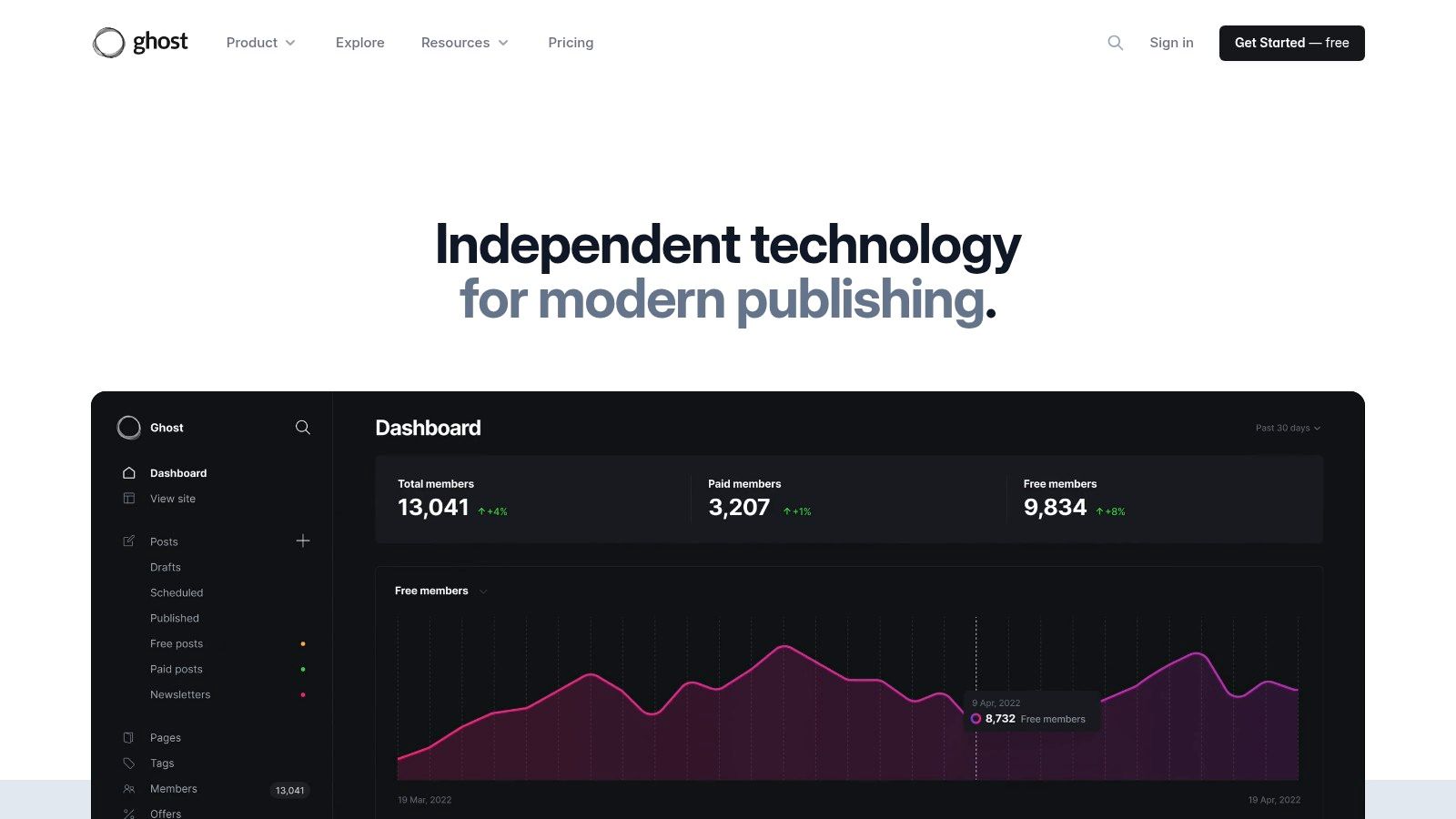
Ghost's core strength lies in its streamlined writing experience. The clean, distraction-free interface allows writers to focus solely on crafting compelling content. This is further enhanced by its excellent performance and fast loading speeds, crucial for retaining readers in today's fast-paced digital world. Unlike platforms burdened by plugin bloat, Ghost’s lean architecture ensures a smooth and responsive experience for both writers and readers.
Beyond the writing experience, Ghost excels in its integrated monetization features. Built-in newsletter and email marketing tools make it easy to connect with your audience and build a subscriber base. This is complemented by robust membership and subscription features, allowing writers to offer premium content and generate recurring revenue directly from their blog. This focus on monetization sets Ghost apart from free blogging platforms, making it a viable option for those seeking to build a sustainable online business around their writing. For example, independent bloggers can use Ghost to offer exclusive content to paying members, while digital marketing professionals can leverage the platform to build a targeted email list for lead generation.
While Ghost offers numerous advantages, it's essential to consider the platform's limitations. The learning curve can be steeper compared to simpler blogging platforms like Blogger or Wix. Its pricing, while offering excellent value, is higher than basic blogging platforms, requiring a monthly subscription for either the hosted version or the costs associated with self-hosting. The theme selection, though modern and aesthetically pleasing, is more limited than WordPress, and the availability of third-party integrations is also less extensive.
Ghost offers several pricing tiers depending on the features and level of support required. The basic plan starts at $11 per month for the hosted version, scaling up to higher tiers with increased member limits and functionality. Self-hosting offers greater control and flexibility but requires technical expertise to manage the server infrastructure.
Setting up Ghost is relatively straightforward, especially if you opt for the hosted version. The platform provides clear instructions and documentation, guiding you through the process of setting up your blog and configuring its features. For the self-hosted route, a basic understanding of server management and command-line interface is necessary.
Comparing Ghost with other blogging platforms like WordPress, it becomes clear that Ghost prioritizes a specific niche. WordPress, known for its flexibility and vast plugin ecosystem, caters to a broader audience with varying technical skills and needs. While WordPress offers greater customization options, it can also become complex and require ongoing maintenance. Ghost, in contrast, offers a more focused and streamlined experience tailored for writers prioritizing performance, elegant design, and integrated monetization.
In conclusion, Ghost deserves its place on this list of blogging sites for writers because of its dedicated focus on content creation, performance, and built-in monetization tools. It's an ideal choice for writers seeking a platform that allows them to focus on their craft while providing the tools to build a loyal audience and generate revenue from their work. Though it might not be the perfect fit for everyone due to its pricing and learning curve, for serious writers seeking a powerful and elegant platform, Ghost is definitely worth considering.
5. Substack
Substack has carved a unique niche for itself among blogging sites for writers, focusing on the power of direct communication and monetization. Unlike traditional blogging platforms, Substack prioritizes newsletters as the primary content delivery method, enabling writers to build a loyal following and generate income through paid subscriptions. This platform has become incredibly popular, especially among journalists, independent writers, and thought leaders seeking greater control over their content and a closer connection with their audience. It essentially combines the best of both worlds: blogging and email marketing. Substack handles the technical complexities, allowing writers to dedicate their time and energy to what they do best – creating compelling content. For writers prioritizing audience engagement and revenue generation, Substack offers a compelling proposition.
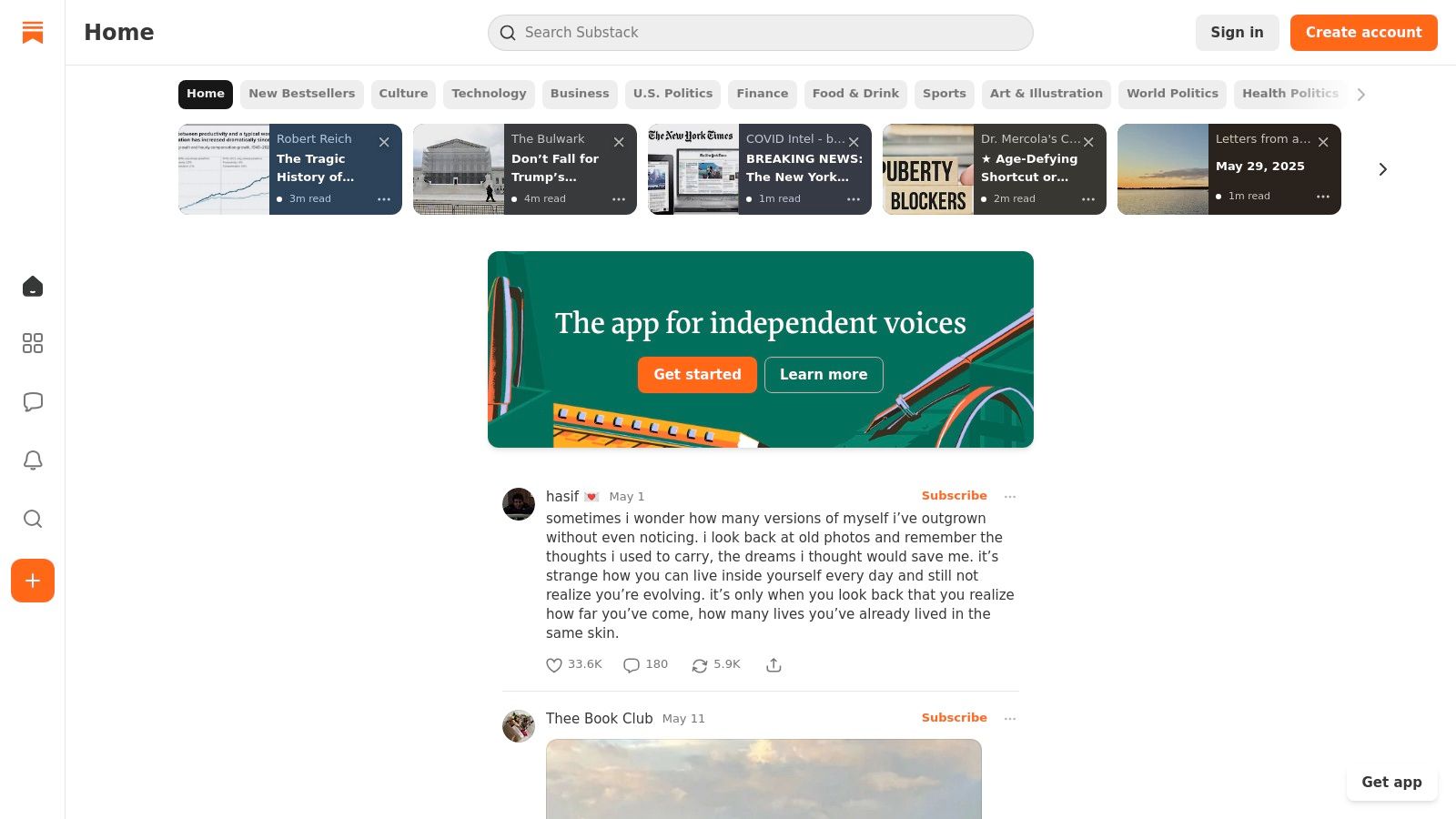
Substack stands out as a powerful blogging site for writers due to its streamlined approach to content creation and monetization. One of its most attractive features is the seamless integration of email newsletters and blog publishing. Every post you create on Substack automatically gets delivered to your subscribers' inboxes, fostering a direct line of communication and encouraging higher engagement rates than traditional social media sharing. The platform also provides built-in paid subscription tools, empowering writers to monetize their work directly from their audience. This eliminates the reliance on advertising revenue and gives creators more control over their income streams. Learn more about Substack and how to leverage its features for newsletter monetization.
Setting up a Substack is remarkably simple. There are no technical requirements to worry about, as the platform handles all the hosting, design, and technical maintenance. This ease of use makes it an ideal choice for writers who prefer to focus on crafting their content rather than grappling with technical details. The intuitive writing interface is clean and distraction-free, providing a conducive environment for focused writing. Substack also offers a mobile app for both readers and writers, facilitating content creation and consumption on the go. Analytics and subscriber management tools are also integrated into the platform, allowing writers to track their performance and understand their audience better.
While Substack offers substantial benefits, it also has some limitations. Customization and branding options are somewhat restricted compared to self-hosted blogging platforms. Writers looking for extensive control over their website's design might find these limitations constricting. Another factor to consider is Substack's revenue-sharing model. The platform takes a 10% cut of all subscription revenue, which can impact a writer’s overall earnings, particularly as their subscriber base grows. Furthermore, while Substack posts are accessible on the web, they generally receive fewer SEO benefits compared to blogs hosted on dedicated platforms. This can make it more challenging to attract organic traffic from search engines. Finally, writers have less control over subscriber data and the platform itself compared to owning a self-hosted blog.
Compared to platforms like WordPress, which requires technical setup and ongoing maintenance, or Medium, which focuses on community engagement but offers limited monetization options, Substack strikes a balance between ease of use and revenue generation. It’s particularly well-suited for writers who prioritize building a direct relationship with their audience and generating income through subscriptions. For those primarily interested in maximizing SEO and website customization, other platforms might be more suitable.
For writers seeking to build a loyal audience, generate recurring revenue, and simplify the technical aspects of blogging, Substack deserves a serious look. The platform's integrated email newsletter system, monetization tools, and user-friendly interface make it an appealing option for writers across various niches. While the platform's revenue share and limited customization options are worth considering, the potential for direct reader engagement and consistent income makes Substack a powerful tool for writers in today's digital landscape. If you are a writer looking for a platform that prioritizes direct connection with readers and offers a seamless monetization strategy, Substack could be the ideal solution for you. It allows you to focus on what you do best – writing – while handling the technicalities of publishing and distribution.
6. Blogger
Blogger, Google's free blogging platform, has been a mainstay for writers since its inception in 2003. It offers a refreshingly straightforward approach to blogging, seamlessly integrating with Google's suite of services. While it may not boast the cutting-edge features of some newer platforms, Blogger remains a reliable and completely free option for writers seeking simplicity and ease of use. This makes it an especially appealing choice for beginners or those primarily focused on written content rather than complex website design. If you're looking for blogging sites for writers, especially if you're just starting out, Blogger is definitely worth considering.
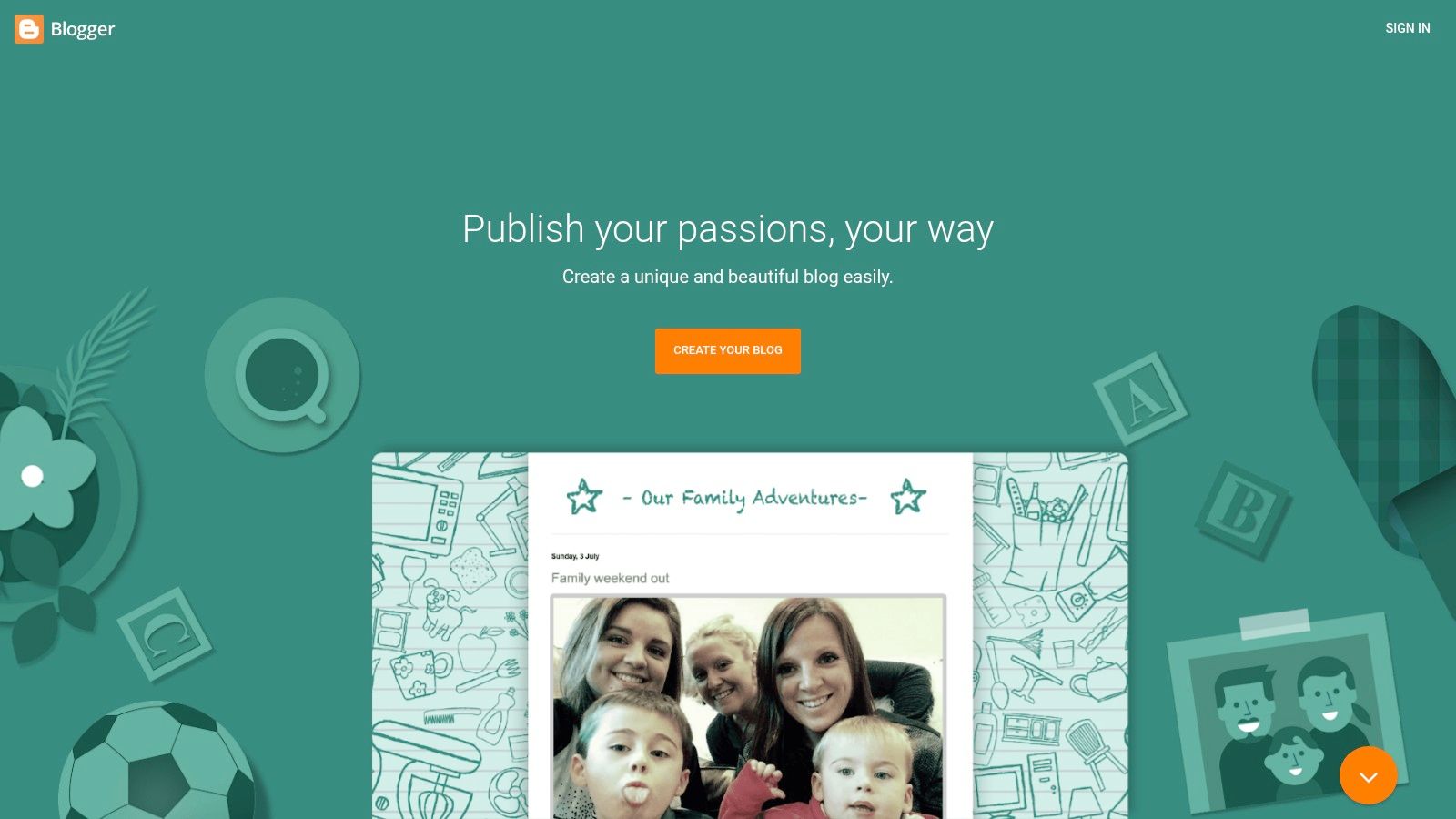
One of Blogger's most significant advantages is its completely free nature. There are no premium tiers or hidden costs, making it an accessible option for writers on any budget. This free service includes reliable hosting, backed by Google's robust infrastructure, ensuring your blog remains online and accessible to readers. This is a key differentiator compared to self-hosted platforms, which require ongoing investment in hosting and maintenance.
For writers already immersed in the Google ecosystem, Blogger offers seamless integration with services like Google Analytics and AdSense. This integration simplifies website traffic analysis and monetization, making it easy to track your blog's performance and potentially generate income. Connecting your existing Google account streamlines the setup process, allowing you to start blogging almost immediately.
Blogger's simplicity extends to its template customization. While the design options may not be as extensive as those offered by other platforms, the drag-and-drop interface allows for easy personalization. You can choose from a variety of pre-designed templates and tweak them to match your brand or personal style, all without needing any coding knowledge. This makes it a great blogging sites for writers who prioritize ease of use over extensive design flexibility.
The platform also offers custom domain support at no extra cost. This means you can replace the standard "blogspot.com" address with your own domain name, giving your blog a more professional and credible appearance. This is crucial for building a strong online presence and brand identity, particularly for small business owners and freelancers.
Despite its strengths, Blogger does have some limitations. Its feature set is less extensive than some newer platforms, particularly regarding advanced functionalities like e-commerce integration or membership options. Customization options are also more limited, which can make it challenging to create a truly unique and visually striking blog. Compared to platforms like WordPress, which offer a vast library of plugins and themes, Blogger's simplicity can sometimes feel restrictive. However, for writers primarily focused on content creation and dissemination, these limitations might be negligible.
Another drawback is the perceived lack of professional appearance and credibility compared to self-hosted options. While a custom domain can mitigate this somewhat, the association with a free platform can sometimes give the impression of a less serious endeavor. However, this perception is often subjective and can be overcome with high-quality content and consistent branding.
For writers seeking a simple, free, and reliable blogging platform, Blogger offers a solid foundation. Its integration with Google services, ease of use, and free hosting make it a particularly attractive option for beginners. While it lacks the advanced features and customization options of some competitors, its straightforward approach makes it an ideal choice for writers prioritizing content creation over complex design. If you're seeking blogging sites for writers and value simplicity and ease of use above all else, Blogger is a platform worth exploring. You can get started right away by visiting https://blogger.com.
For those who are comfortable with a slightly steeper learning curve and desire more control over design and functionality, platforms like WordPress offer a wider range of options, albeit at a cost. However, for writers seeking a simple and free entry point into the world of blogging, Blogger remains a valuable and accessible tool. Its ease of use, combined with Google's reliable infrastructure and service integration, makes it an excellent starting point for building an online presence.
7. Wix
Wix stands out as an all-in-one website builder offering robust blogging capabilities integrated seamlessly with its drag-and-drop interface. It’s a particularly compelling choice for writers seeking a holistic online presence that goes beyond just a blog. Whether you're a novelist showcasing your latest work, a freelance writer building a portfolio, or a journalist creating a personal brand, Wix provides the tools to craft a complete online experience, incorporating sections for your blog, portfolio, contact information, and even e-commerce functionalities. This comprehensive approach allows writers to centralize their online presence, managing their blog and other website elements from a single platform.
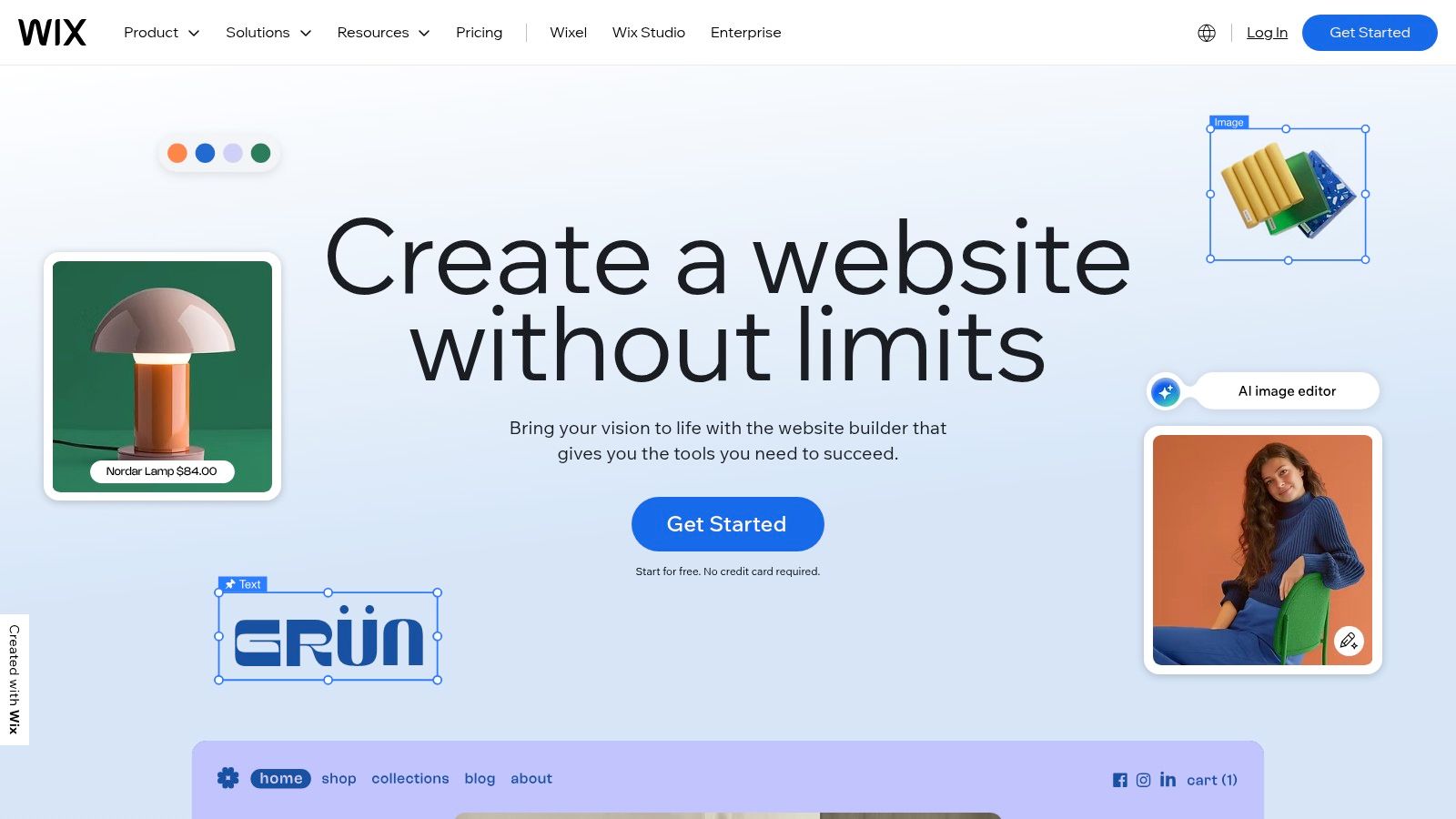
Wix distinguishes itself with its Artificial Design Intelligence (ADI) feature, which streamlines the website creation process. By answering a few simple questions about your needs and style preferences, ADI generates a personalized website template, saving you significant time and effort. This feature is particularly helpful for writers who may not have extensive web design experience or simply prefer to focus on their writing rather than the technicalities of website building.
From a feature perspective, Wix boasts a vast app marketplace, expanding its core functionality to include SEO tools, email marketing integrations, social media connectivity, and more. This extensive ecosystem allows writers to customize their websites to meet their specific needs. For example, you could integrate a mailing list signup form to grow your audience or add a live chat feature to interact with your readers in real-time. The built-in SEO tools empower writers to optimize their blog posts and website content for search engines, improving their visibility online and attracting a wider readership. Furthermore, Wix ensures mobile optimization, making sure your website looks great and functions flawlessly on any device. This responsiveness is crucial in today’s mobile-first world.
One of Wix's strongest suits is its e-commerce integration. Writers can leverage this feature to monetize their work directly by selling books, online courses, or other digital products. This capability positions Wix as a viable platform for writers looking to establish an online business or supplement their income through digital sales. Consider the scenario of a self-published author. With Wix, they can seamlessly integrate a bookstore directly into their website, eliminating the need for third-party platforms and maintaining complete control over the sales process.
While Wix offers a plethora of benefits, it's essential to consider its limitations. Compared to dedicated blogging platforms like WordPress, Wix can sometimes feel slower, especially for websites with extensive content or complex designs. Also, accessing the full range of advanced features often requires subscribing to a premium plan. The pricing varies depending on the chosen plan, starting with free options for basic websites and scaling up to more comprehensive plans with features like custom domains, increased storage, and e-commerce capabilities. Learn more about Wix and how to get started. While the user interface is generally user-friendly, mastering the more complex customization options might involve a steeper learning curve. Finally, it’s worth noting that Wix, being a general website builder, is less focused on the pure blogging experience compared to platforms specifically designed for blogging.
For writers who prioritize design flexibility, require a comprehensive online presence beyond just a blog, and value a user-friendly interface, Wix emerges as a strong contender. However, if your primary focus is solely on blogging and you anticipate a high volume of content, a specialized blogging platform might be a more efficient choice. Consider your specific needs and priorities when choosing the best platform for your writing endeavors. For example, a writer building a portfolio and selling writing services would find Wix's all-in-one approach beneficial, whereas a writer primarily focused on publishing frequent blog posts might prefer a platform like WordPress for its streamlined blogging experience.
Implementing Wix is relatively straightforward. The drag-and-drop interface simplifies the design process, allowing you to add and arrange elements intuitively. However, for more complex customizations, it might be beneficial to explore Wix's support resources or consider hiring a Wix expert for assistance. This is particularly relevant for writers who want to leverage advanced features or require a highly tailored design. Wix's comprehensive help documentation and active user community provide valuable support and resources for users of all skill levels.
8. Squarespace
Squarespace stands out among blogging sites for writers due to its emphasis on aesthetics and user-friendly interface. It presents a compelling option, particularly for those prioritizing a visually appealing and professional online presence. If you're a writer seeking a platform that seamlessly blends design and functionality, Squarespace deserves serious consideration. It empowers writers to build stunning websites without needing coding expertise, allowing them to focus on what they do best: writing. It's an all-in-one platform, meaning hosting, security, and updates are handled for you, freeing up your time and energy for creating compelling content. This makes Squarespace a particularly appealing option for blogging sites for writers who may not have the technical skills or desire to manage the backend complexities of a website.

Squarespace offers a curated collection of professionally designed templates, ideal for showcasing your writing portfolio, blog posts, or even selling books directly to your audience. These templates are designed with visual storytelling in mind, offering layouts that enhance the readability and impact of your written content. Imagine a novelist presenting their latest work on a beautifully designed landing page, a poet sharing their verses on a minimalist, elegant blog, or a freelance writer showcasing their portfolio with impactful visuals – Squarespace facilitates all of this.
A key feature that elevates Squarespace as one of the best blogging sites for writers is its built-in SEO tools. These tools enable you to optimize your blog posts for search engines, making it easier for your target audience to discover your work. From customizing meta descriptions to adding alt text to images, Squarespace provides a user-friendly interface for managing essential SEO elements. This functionality is crucial for writers looking to build an online readership and establish their authority in their niche. The integrated analytics dashboard provides valuable insights into your website's performance, allowing you to track traffic sources, popular content, and audience engagement.
Compared to other platforms like WordPress, Squarespace offers a less complex setup process. While WordPress offers extensive customization options through plugins and themes, it often requires a steeper learning curve and more technical involvement. Squarespace's streamlined approach, with its drag-and-drop interface and all-in-one structure, makes it a great choice for writers who prefer simplicity and ease of use. However, this simplicity comes at the cost of flexibility. While Squarespace offers a range of templates, the customization options are less extensive than WordPress. This can be a limiting factor for writers who require highly specific design elements or advanced functionality.
For writers looking to monetize their work, Squarespace offers integrated e-commerce and appointment scheduling functionalities. This allows you to sell products, offer online courses, or schedule consultations directly through your website. Imagine a writing coach offering online workshops, or a novelist selling signed copies of their latest book – these are all possible within the Squarespace ecosystem. This streamlined approach to monetization is a significant advantage, simplifying the process of building a sustainable online business around your writing.
Pricing and Technical Requirements:
Squarespace operates on a subscription model, with various pricing tiers catering to different needs. The Personal plan, suitable for basic blogs, starts at around $16/month when billed annually. For more advanced features like e-commerce and marketing functionalities, higher-tier plans are available. There are no specific technical requirements to use Squarespace. All you need is an internet connection and a web browser to access the platform and manage your website.
Implementation and Setup Tips:
- Choose the Right Template: Explore the template library and select one that aligns with your writing genre and brand aesthetic.
- Customize Your Design: Use the Style Editor to personalize fonts, colors, and layout elements to reflect your unique style.
- Optimize Your Content for SEO: Utilize Squarespace's built-in SEO tools to maximize your website's visibility in search results.
- Connect Social Media Accounts: Integrate your social media profiles to promote your blog posts and engage with your audience.
- Explore Squarespace Extensions: Enhance your website's functionality with various extensions for email marketing, analytics, and more.
Squarespace (https://squarespace.com) might be the ideal blogging platform for you if you value a professional, visually appealing website and prioritize ease of use. While it may not offer the same level of customization as some other platforms, its streamlined interface, beautiful templates, and integrated features make it an excellent choice for writers who want to focus on creating compelling content without getting bogged down in technical complexities. Its all-in-one nature, combined with its focus on design and user experience, makes it a powerful tool for writers looking to establish a strong online presence.
Top 8 Blogging Platforms for Writers Comparison
| Platform | Core Features ✨ | User Experience ★★★★☆ | Value Proposition 💰 | Target Audience 👥 | Unique Selling Points 🏆 | Price Points 💰 |
|---|---|---|---|---|---|---|
| BlogMaker 🏆 | No-code platform, hosting, SSL/CDN, SEO-ready, auto backups, DesignStudio customization, newsletter integration | Intuitive dashboard, instant previews, privacy-first analytics | Flat yearly pricing, predictable budgeting | Individuals, businesses, marketers, freelancers | SEO boost via /subdirectory, green energy powered, 24/7 support | Flat yearly pricing (inquire on site) |
| WordPress.com | Extensive themes, SEO tools, social integration | Highly customizable, large community | Freemium with premium plans | Bloggers, businesses, developers | Huge plugin ecosystem, strong SEO | Free to premium plans |
| Medium | Built-in audience, minimalist interface, Partner Program | Clean UI, reader engagement | Monetization via Partner Program | Writers focusing on storytelling | Built-in audience, algorithm-driven discovery | Free (some monetization features) |
| Ghost | Newsletter tools, membership monetization, fast performance | Modern interface, SEO built-in | Powerful monetization options | Professional writers, journalists | Open-source, fast, membership/subscription focused | Paid plans, more costly |
| Substack | Newsletter + blog, paid subscriptions | Simple UI, no tech upkeep | Strong subscription monetization | Writers, journalists, thought leaders | Direct audience via email, easy monetization | Platform takes 10% of revenue |
| Blogger | Free, Google integration, custom domain | Basic interface, easy for beginners | Completely free | Beginners, casual bloggers | Free hosting by Google, Google Ads integration | Free |
| Wix | Drag & drop builder, AI design, SEO tools | Visual customization, all-in-one website | Versatile site + blog + e-commerce | Non-technical users, creatives | AI design, extensive app marketplace | Freemium with premium plans |
| Squarespace | Designer templates, SEO, e-commerce | Professional, polished design | Premium all-in-one website & blog | Creatives, authors, businesses | Premium visuals, integrated e-commerce | Premium pricing (higher cost) |
Choosing Your Blogging Platform: Next Steps
Finding the right blogging platform is a crucial step for any writer, whether you're a small business owner, a digital marketing professional, or an independent blogger. This list of blogging sites for writers has explored a range of options, from the simplicity of Blogger to the robust features of WordPress.com, the focused publishing of Substack, and the sleek design of Squarespace. Key takeaways include considering your technical comfort level – platforms like Wix and Squarespace require less technical expertise, while Ghost and self-hosted WordPress offer more control but demand more technical knowledge. Also, consider your budget and whether a free platform like Medium or Blogger meets your needs, or if a paid option like Substack or Ghost offers the features and monetization options you’re looking for. Finally, think about your community engagement goals: platforms like Medium and Substack have built-in audiences, while others may require more effort to build a readership.
Choosing the best blogging sites for writers is all about aligning the platform's capabilities with your specific goals. Do you prioritize customization? Ease of use? SEO capabilities? Monetization options? By carefully weighing these factors, you can confidently select the perfect platform to empower your writing journey.
Ready to start building your blog with a platform designed specifically for writers? Explore the intuitive interface and powerful features of BlogMaker, a platform built to streamline your writing process and help you connect with your audience. Sign up for a free trial today and see how BlogMaker can elevate your blogging experience.
SEO–ready, Analytics, No–code.
Your Content Publishing Engine
Deliver your SEO–driven content!
Visit BlogMaker.app



